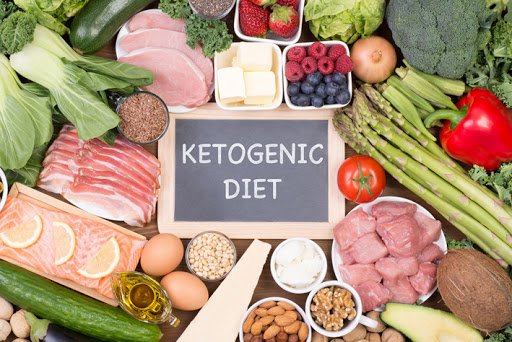Learn about the 12 most popular diets in the world
There are many diets to lose or balance weight, but the breadth and variety worldwide are genuinely unique. Some diets focus on reducing your appetite, while others limit your calorie, carbohydrate, and fat intake. Since all of these diets claim to be superior to each other, it is tough to choose one of them. The truth is that no diet can work for everyone in the same way, or what worked for you can work for someone else. In the following, we will be with you by introducing 12 popular diets for weight loss.

1- Paleolithic diet
Those interested in this diet should consume foods that their ancestors used before the world of agriculture expanded. This theory clearly shows that most modern diseases are related to cereals’ consumption, dairy products, and other processed foods. While providing the same nutrients that our ancestors used to consume before agricultural development is questionable, it has different benefits.
How it works: The Paleolithic regimen places a lot of emphasis on eating whole foods, lean protein, vegetables, fruits, nuts, and grains, while eliminating processed foods such as sugar, dairy, and whole grains. Of course, some of the more flexible models of this diet make it possible to consume dairy products such as cheese and butter, such as potatoes and sweet potatoes.
Weight Loss: Numerous studies have shown that the Paleolithic regimen can significantly reduce weight and even reduce waist size. Some studies show that the Paleolithic diet consumes fewer carbohydrates, more protein, and 300 to 900 fewer calories per day.
Based on the available information, it can be said that regimen is effective in lowering cholesterol, blood sugar, blood triglycerides, and blood pressure. Note that this diet eliminates grains, legumes, and dairy products that are healthy and nutritious. (Diet To Treat Osteoarthritis; Useful And Harmful Foods For Osteoarthritis)
2- Vegan diet
A vegan diet that includes a full intake of vegetables
The vegan diet means you have to say goodbye to animal products ultimately. This diet prevents the consumption of all animal products for ethical, environmental, or health reasons. Note that we must introduce veganism as the most challenging form of vegetarianism. It is good to know that you should not consume meat, dairy products, eggs, and other animal products such as honey, whey, albumin, and other vitamin D3.
Weight Loss: A vegan diet seems to help people lose weight; this can be attributed to its low fat and high fiber, making people feel healthier.
Vegan diets are more consistently associated with weight loss and body mass index (BMI) than other diets. An 18-week study found that people on a vegan regimen lost 4.2 kilograms. Weight loss will be followed by fatigue and constant tiredness. Vegans can also be considered a good diet for slimming the abdomen and hips.
Other benefits: Vegetarian-based diets reduce heart disease risk, type 2 diabetes, and premature death. Limiting processed meat consumption may reduce the risk of Alzheimer’s disease and death from heart disease or cancer. Limiting processed meat consumption may reduce the risk of Alzheimer’s disease and death from heart disease or cancer.
Important Note: Because vegan diets prevent you from eating animal foods, you may be deficient in several nutrients: Vitamin B12, Vitamin D, Iodine, Iron, Calcium, Zinc, and Omega-3 Fatty Acids.
3- Low carb diets
Low carb diets are popular among people who decide to lose weight. There are several types of low carb diets, but they all include limiting carbohydrate intake to 20 to 150 grams per day. The diet’s primary goal is for the body to use more fats for metabolism instead of carbohydrates as the primary energy source.
Function: Low carb diets emphasize total protein and fat intake and severely limit carbohydrate intake. In the absence of carbohydrates, which are the primary energy source, your body can replace fatty acids and ketones.
Weight loss: Many studies have shown that low carb diets significantly affect weight loss, especially overweight and obese people.
They seem to be effective in reducing the dangerous belly fat that can form around your limbs. People on low-carb diets enter a state called ketosis. Numerous studies show that ketogenic diets can lead to weight loss, up to twice as much as a low-fat, high-calorie regimen.
Other benefits: This low carb regimen will reduce appetite and can help prevent obesity. Note that low carb diets are not for everyone. Some of them may feel good, and for some people, it may seem not easy. Some people can experience an increase in bad cholesterol. In sporadic cases, low-carb diets have been shown to cause a severe condition called non-diabetic ketoacidosis. This condition seems to be more common in breastfeeding women and can be fatal if left untreated, but in general, low-carb diets are safe for most people.

4- Dukan diet
This diet can be described as a slimming regimen with high protein and low carbohydrates, divided into four stages; These four stages include two stages of weight loss and two stages of weight maintenance. Your shelf life at each stage depends on the weight you intend to lose. Each stage has a diet pattern.
Function: The stages of weight loss are primarily based on low-protein foods and oat bran consumption. Other steps also include the addition of non-starchy vegetables, followed by some carbohydrates and fats. Next, and for the next few days, there will be amounts of protein to maintain your new weight.
Weight loss: According to one study, women consume 1,000 calories and 100 grams of protein per day, which causes them to lose an average of 15 kg of body weight in 8 to 10 weeks.
Many other studies also show that diets low in protein and low in carbohydrates may have many weight-loss benefits.
Other benefits: Some people may think that this regimen has other benefits, but this is not the case and has no other benefits other than weight loss. Of course, there is very little research on the quality of the shop diet. This diet limits the intake of carbohydrates and fats together, indicating that it follows a science-based strategy and instead seems to be consuming fat as part of a high-protein diet compared to low-fat diets. It gets greasy.
Be aware that losing muscle mass and severely limiting calorie intake may help the body save energy, helping you regain weight after losing weight.
5- Low-fat diet
As it turns out, a low-fat regimen limits your fat intake to less than 10 percent of your daily calories. In general, a low-fat diet provides about 30% of its calories from fat. Studies show that this diet has no effect on weight loss in the long run. Fans of the low-fat diet claim that fat consumption in this diet is not very limited, while to increase physical health and lose weight, fat intake should be less than 10% of total calories.
Function: Low-calorie diet contains less than 10% fat. Consumption of plant products in this diet is far more recommended than the consumption of animal products. In general, it can be said that the amount of carbohydrates in this regimen is very high and seems to be about 80% of calories, while the amount of protein is less than 10%.
Weight loss: According to available information, this regimen has been very successful in weight loss in obese people; On average, obese people have lost about 63 kg with this diet, a remarkable statistic. This diet can be introduced as a weight loss diet in a month and has a particular function.
The results of another study conducted during 8 weeks show well that a regimen consisting of 7 to 14% fat reduces weight by 14.8 kg.
Other Benefits: Some studies show that low-fat diets can improve several risk factors, such as high blood pressure, high cholesterol, and other inflammatory conditions. Surprisingly, this diet can lead to a significant progression of type 2 diabetes.
Note that fat restriction can cause long-term problems and can be attributed to the critical role of fat in the body; This role can be attributed to helping build cell membranes, hormones and helping the body absorb fat-soluble vitamins.
In addition to all this, we must say that a low-fat regimen limits the consumption of many healthy foods, lacks variety, and can be challenging to tolerate.

6- Atkins diet
The Atkins diet is the most popular low carb diet. Proponents of this diet believe that as long as carbohydrate consumption is stopped or reduced, weight loss can be experienced and continued by consuming large amounts of protein and fat. The main reason for the effect of diets based on reducing carbohydrate intake can reduce appetite; This will make you burn fewer calories without thinking about it.
Function: The Atkins diet is divided into four stages. The first step is to reduce your carbohydrate intake to 20 grams per day for two weeks. Once you reach your ideal weight, you can slowly consume the required amount of carbohydrates.
Weight loss: The Atkins regimen is widely studied and leads to faster weight loss than the low-fat diet. Other studies show that low carb diets are also very useful in weight loss, especially they can be effective in reducing belly fat, which is the most dangerous type of fat.
Other Benefits: Numerous studies have shown that low-carb diets such as the Atkins regimen may reduce the number of risk factors for the disease, such as blood triglycerides, cholesterol, blood sugar, insulin, and blood pressure. Low carb diets can improve blood sugar, good cholesterol, triglycerides, and more compared to other weight-loss diets.
Important Note: Atkins’s diet, like other low-carb diets, is suitable for most healthy people, but in rare cases, it can cause problems.
7- HCG diet
Without a doubt, the HCG diet should be considered one of the fastest and most difficult diets for weight loss. In this diet, you should lose up to 1 kg of weight per day. Proponents of this diet believe that this diet will eliminate fat without causing a feeling of hunger. It is good to know that HCG is the name of a hormone present in large quantities during pregnancy. It tells the woman that she is pregnant and has the task of maintaining the production of hormones necessary for the fetus’s growth. It is also used to treat infertility problems.
Function: This diet is divided into three different parts. The first step is to start taking HCG supplements. In the second step, you should choose a low-calorie diet (500 calories per day) and follow HCG supplements under a doctor’s supervision; This stage is related to weight loss and will last up to 3 to 6 weeks. In the third step, you should stop taking HCG and slowly increase your food intake.
Weight Loss: The HCG diet causes weight loss, but some new research results show that weight loss is due to following low-calorie diets and has nothing to do with HCG. No association was found between HCG and reduced hunger.
Other Benefits: Leaving aside weight loss and the effect of this diet in achieving results, it can be said that there are no documented benefits of the HCG diet. Just like most low-calorie diets, HCG may cause muscle wasting that will not result in anything other than a reduction in the ability to burn calories.
This severe calorie restriction causes the number of calories burned by the body to experience a declining trend; This will make your body feel hungry and conserve more energy than before.
It is good to know that most of the HCG supplements on the market are non-genuine, and you should consult your doctor directly. The HCG diet also has more side effects, including headaches, fatigue, and depression. Interestingly, researchers also published a report on a woman’s blood clotting, and it seems that the cause of this problem was following the HCG diet. Note that the FDA disapproves of this diet and considers it dangerous, illegal, and a scam.
8- Zone diet
The diet of the zone, which includes the consumption of fish, meat and vegetables, etc.
The zone diet should be introduced as a low glycemic diet that reduces daily calorie, protein, and fat intake by 35%, 45%, and 30%, respectively. We recommend eating only carbohydrates with a low blood sugar index. The body’s digestive system estimates how much your blood sugar will rise after consumption. This regimen was initially designed to reduce inflammation, weight loss, and the risk of chronic diseases.
Function: According to the available information, by choosing this diet, you should combine about one-third of your meal with protein, two-thirds of it with fruit, and one part of it with unsaturated fats such as olive, avocado, or almond oil. . You should also limit your intake of high-GI carbohydrates such as bananas, rice, and potatoes.
Weight loss: Research on this type of diet is contradictory. While some point to its effect on weight loss and appetite, others do not consider the weight loss caused by this diet to be significant compared to other diets.
Other benefits: The most excellent effect of this diet can reduce the risk factors for heart disease, such as lowering cholesterol and triglycerides. Another study shows that the zone diet may reduce blood sugar, waist circumference, chronic inflammation in overweight or obese people with type 2 diabetes. One of the problems with this diet is that it limits foods such as bananas and potatoes.

9- Fasting
Intermittent fasting can also help you lose weight. In fact, instead of limiting the foods you eat, it is better to control them.
Function: Intermittent fasting is commonly used to lose weight and can be attributed to calorie restriction.
Weight Loss: Results from people who have chosen to fast to lose weight show that they have been about 3 to 8 percent more successful than other methods.
Other Benefits: It is good to know that intermittent fasting can also reduce inflammation, cholesterol, triglyceride, and blood sugar levels. Of course, growth hormone enhancement, improved cell repair, and insulin sensitivity should not be overlooked, each of which has a significant impact on health. Even animal studies of this diet show effects such as the growth of new brain cells, increased longevity, and immunity to disease and Alzheimer’s.
Although intermittent fasting can have many positive effects on physical health, it is not suitable for everyone. Some studies show that fasting is not as good for women as it is for men. Fasting can also be dangerous for hypoglycemia, malnutrition, breastfeeding mothers, pregnant women, adolescents, children, and the like.
10- Ketogenic diet
This diet has been known as a treatment for epilepsy for several decades and has also been studied in various fields. In general, it can be said that the primary purpose of this diet is to reduce carbohydrate intake and fat absorption; This may sound a little ridiculous, but it allows the body to burn fat instead of burning carbs.
Healthy fats are found in avocados, coconuts, grains, fish oils, and olive oils and are added freely to the diet. Diet breaks down fat stores as metabolism, and through a process called ketosis, produces substances called ketones.
This diet has risks such as ketoacidosis for people with type 1 diabetes and may lead to coma or death in people. Of course, it should not be forgotten that the results of some studies on diabetes management, metabolic health, weight loss, and body composition change are promising.
11- The Whithers Diet
One of the most popular diets in the world is the Whitwaters diet. This valuable diet can help you strike the right balance between the foods you eat and experience weight loss. This diet’s main pattern is to consume foods high in calories, saturated fat, low sugar, and protein. Based on the information available, you are not prohibited from any food, but you should balance.
To name a few popular foods in the Whitwaters diet, we need to mention low-fat proteins such as eggs, fish, and lean yogurt. Of course, we should not forget starchy vegetables such as cabbage and fresh fruits and healthy fats such as avocado.
12- Raw vegetarian diet
A raw vegetarian diet includes foods and beverages that are unprocessed, entirely plant-based, and organically available. Food researchers believe that at least three-quarters of the food people eat should be uncooked.
It is interesting to note that many nutritionists are also vegetarian raw and do not consume anything animal-based. Keep in mind that there are four major types of vegetarian diets. Undoubtedly, those who choose and follow a raw vegetarian diet should have a lot of tolerance and enjoy the results. We should introduce raw vegetarianism as a healthy diet.


